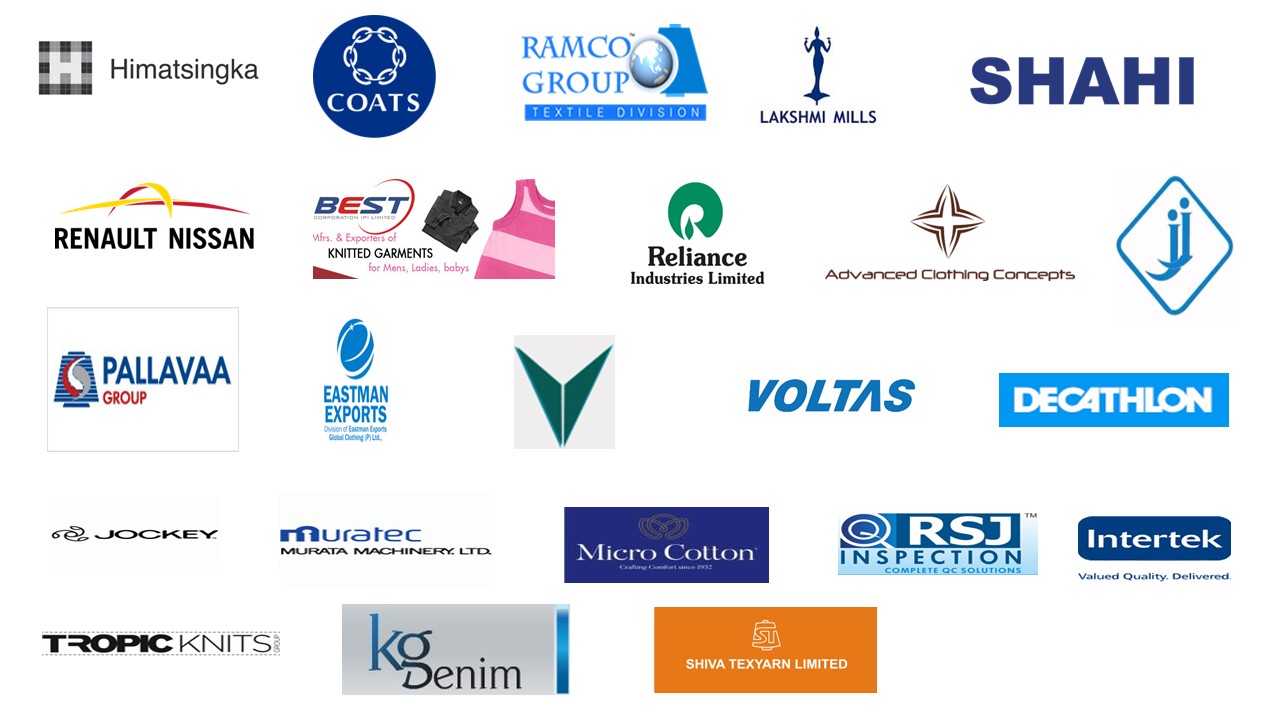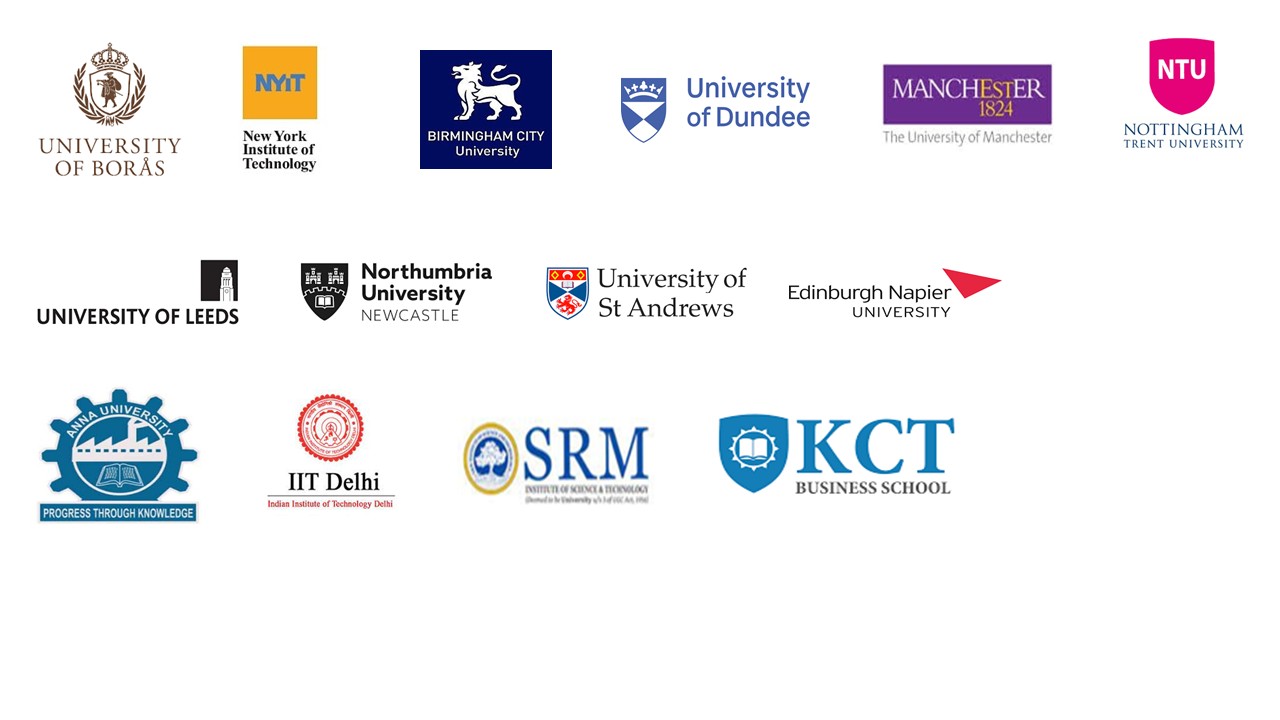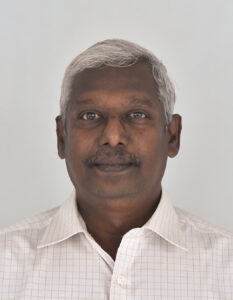About the Department
To harness the potential of textile industry in Coimbatore which is often identified with its sobriquet “Manchester of South India”, and to augment the contribution to fashion industry, Kumaraguru College of Technology started the Textile Engineering Department in the year 1995. The department has 13 professionally well qualified and highly experienced faculty members including 6 Doctoral faculty members. It is well-equipped with modern day facilities in its laboratories to provide ample opportunity to the students to explore their penchant for learning and innovation in the very supportive environment of Coimbatore.
From the HOD’s Desk

Dr. M. Saravanan,
Assistant Professor III & Head
The Department of Textile Technology is committed to generate new knowledge by engaging in avant-garde research and promoting academic growth by offering technologically advanced undergraduate, postgraduate and doctoral programmes. The department is vibrant in developing human potential to its fullest extent so that academically capable and technologically sound can emerge in a range of textile professions. The department is undertaking collaborative projects which offer opportunities for long-term interaction with academia and industry. The department offers curriculum of International standards with excellent teaching by well experienced and highly qualified faculty, a well-equipped laboratory with state-of-the-art machinery, and by undertaking memorandums of understanding with leading textile industries at the national and international levels.
Vision
To be a Centre of Excellence in Textile Technology and Management with basic and applied research for the fulfilment of societal needs.
Mission
- Develop industry-relevant curriculum, innovative teaching, and project-based learning methods that enables students to be efficient professionals.
- Motivate Faculty to update their knowledge and skills through continuous learning.
- Provide holistic student development by creating opportunities for lifelong learning and to develop entrepreneurship skills.
- Undertake inter-disciplinary research and development/Internship/Consultancy in the field of Textile Technology to support the industry and society.
Curriculum & Syllabus – UG Regulations
- B.Tech – Textile Technology Semester I to IV – R 24
- B.Tech – Textile Technology – R 18 (For 2021-2025 batch)
- B.Tech – Textile Technology – R 18 (For 2020-2024 batch)
- B.Tech – Textile Technology – R 18
- B.Tech – Textile Technology – R 17
- B.Tech – Textile Technology – R 15
- B.Tech – Textile Technology – R 14
- B.Tech – Textile Technology 3rd to 8th semesters – R 13
- B.Tech – Textile Technology – R 9
Curriculum & Syllabus – PG Regulations
B. Tech (Textile Technology) – 4 Years (8 Semesters)
| B.Tech | Textile Technology (accredited by NBA, AICTE) | 4 Years (8 Semesters) |
| M.Tech | Technical Textile | 2 Years (4 Semesters) |
| M.Tech | Masters of Technology Management (Affiliated by AICTE, Anna University) | 2 Years, Full Time – 4 Semesters Eligibility B.E. / B.Tech. in any discipline (Award of Degree by Anna University) |
| Ph.D | Textile Technology (Part Time & Full Time) | Min- Max
|
Program Educational Objectives (PEOs)
Graduates of B. Tech – Textile Technology Programme will be able to:
- PEO1: Hold leadership responsibilities in Textile and related segments such as product development, production, technical services, quality assurance and marketing.
- PEO2: Become successful entrepreneur in Textile and related field and contributing to societal, technological and industry development.
- PEO3: Partake professional qualifications/ certifications in Textile Technology related areas by pursuing specialized studies in engineering and business.
Program Outcomes (PO’s)
Graduates of the Textile Technology Undergraduate Program should have the ability to:
- PO 1: Apply the knowledge of mathematics, science, engineering fundamentals, and an engineering specialization to the solution of complex engineering problems.
- PO 2: Identify, formulate, review research literature, and analyze complex engineering problems reaching substantiated conclusions using first principles of mathematics, natural sciences, and engineering sciences.
- PO 3: Design solutions for complex engineering problems and design system components or processes that meet the specified needs with appropriate consideration for the public health and safety, and the cultural, societal, and environmental considerations.
- PO 4: Use research-based knowledge and research methods including design of experiments, analysis and interpretation of data, and synthesis of the information to provide valid conclusions.
- PO 5: Create, select, and apply appropriate techniques, resources, and modern engineering and IT tools including prediction and modelling to complex engineering activities with an understanding of the limitations.
- PO 6: Apply reasoning informed by the contextual knowledge to assess societal, health, safety, legal and cultural issues and the consequent responsibilities relevant to the professional engineering practice.
- PO 7: understand the impact of the professional engineering solutions in societal and environmental contexts, demonstrate the knowledge of, and need for sustainable development.
- PO 8: Apply ethical principles and commit to professional ethics, responsibilities, and norms of the engineering practice.
- PO 9: Function effectively as an individual, and as a member or leader in diverse teams, and in multidisciplinary settings.
- PO 10: Communicate effectively on complex engineering activities with the engineering community and with society at large, such as, being able to comprehend and write effective reports and design documentation, make effective presentations, and give and receive clear instructions.
- PO 11: Demonstrate knowledge and understanding of the engineering and management principles and apply these to one’s own work, as a member and leader in a team, to manage projects and in multidisciplinary environments.
- PO 12: Life-long learning: Recognize the need for, and have the preparation and ability to engage in independent and life-long learning in the broadest context of technological change.
Program Specific Outcomes (PSO’s)
Graduates of the Textile Technology Undergraduate Program will have the ability to:
- PSO1: Apply the knowledge of mathematics, science, engineering fundamentals and an engineering specialization for Process Optimization, Cost and Value analysis, Productivity improvement, Solutions to quality issues and Product development in textile and related fields.
- PSO2: Demonstrate learned techniques, experiments, modern engineering tools and software to estimate the optimum utilization of resources such as raw materials, machineries, manpower and to predict the properties of fibre, yarn, fabric and garments as per the end uses.
M. Tech (Technical Textile) – 2 Years
PROGRAM EDUCATIONAL OBJECTIVES (PEOs)
Graduates of the M. Tech – Technical Textile Programme will be able to:
- PEO1. Acquire comprehensive knowledge and technical skills in advanced textile materials, manufacturing processes, and applications, enabling them to innovate and solve complex problems in the technical textile industry.
- PEO2. Demonstrate leadership and professional excellence in their careers, contributing to the growth and development of the textile industry through ethical practices, effective communication, and continuous learning.
- PEO3. Engage in research and development activities to advance the field of technical textiles, leveraging cutting-edge technologies and methodologies to contribute to academic, industrial, and societal advancements.
PROGRAM OUTCOMES (POs)
Graduates of the M.Tech-Technical Textile Postgraduate Program should have the ability to:
- PO1: Demonstrate comprehensive understanding and application of advanced concepts in technical textiles.
- PO2; Conduct high-quality research and development activities in technical textiles, contributing to scientific and industrial advancements.
- PO3: Develop innovative and sustainable solutions for complex problems in technical textiles.
- PO4: Exhibit proficiency in the use of modern tools, techniques, and equipment relevant to technical textiles engineering and research.
- PO5: Uphold professional and ethical responsibilities in research, industry, and academia, ensuring sustainable and responsible practices.
- PO6: Communicate effectively and demonstrate leadership in multidisciplinary teams, fostering collaboration and knowledge dissemination in the technical textile industry.
PROGRAM SPECIFIC OUTCOMES (PSOs)
Graduates of the M.Tech-Technical Textile Postgraduate Program should have the ability to:
- PSO1: Design and create innovative textiles for protective, defense, automobile, medical, and industrial applications, utilizing advanced materials and technologies to meet specific industry needs.
- PSO2: Perform in-depth research in technical textiles, focusing on improving performance, durability, and functionality, and contribute to advancements in protective, defense, automobile, medical, and industrial textile sectors.
| 2024 | M.Tech- Technical Textile | Started with 12 seats |
| 2023 | NTTM Grant | MoT, NTTM grant for Rs.2.5 crores sanctioned |
| 2022 | B. Tech Textile Technology | NBA Re-Accreditation for 3 Years under Washington Accord (TIER I) |
| 2021 | Lab | Weaving Lab renovated |
| 2020 | Lab | Open end spinning machine has donated by Rieter India Pvt Ltd worth of Rs. 40 Lakhs |
| 2019 | B. Tech Textile Technology | NBA Accreditation for 3 Years under Washington Accord (TIER I) |
| 2018 | MoU | RWTH Aachen University, Germany for Knowledge transfer |
| 2018 | M.Tech Master of Technology Management | Started with 18 seats instead of M. Tech Textile Technology program |
| 2013 | B. Tech Textile Technology | NBA re-accreditation for 5 Years |
| 2012 | New Facility | Created Technical Textile lab |
| 2012 | MoU | Technical University of Liberec, Czech Republic for Knowledge transfer. |
| 2007 | B. Tech Textile Technology | NBA re-accreditation for 3 Years |
| 2005 | Ph.D. | Anna University recognised research centre |
| 2005 | KCT-TIFAC CORE | Textile Technology & Machinery Lab |
| 2004 | B. Tech Textile Technology | Intake increased to 60 seats |
| 2003 | B. Tech Textile Technology | NBA Accreditation for 3 Years |
| 2002 | M.Tech Textile Technology | Started with 18 Seats |
| 1998 | B. Tech Textile Technology | Intake increased to 40 seats |
| 1995 | B. Tech Textile Technology | Started with 30 seats |
Spinning Laboratory – I & II
- Laboratory Incharge: Mr.Velusamy
- Weekly Utilization Status: 6 hours, 1. U18TXI3202 – Yarn Manufacturing Technology I, 2. U18TXT4001 – Yarn Manufacturing Technology-II
- Lakshmi Rieter Mixing bale opener
- Monocylinder opener,
- Step cleaner
- Kirschner beater
- LR C1/3 card; LR 2/4a Sliver lap
- LR 4/1a Ribbon lap;
- LR 7/4 Comber;
- LR1400A Speed frame (36 spindles)
- LR G5/1 Ring frame (24 spindles)
- Trytex Rotor Spinning Machine (40rotors)
- Two-for-one Twister
- Assembly winder
- Compact Spinning Arrangement 12 Spindles
- Open end spinning Riter R-93
Weaving laboratory – I & II
- Laboratory Incharge: Mr.M.S.Jaffersathik
- Weekly Utilization Status: 6 hours, U18TXP3504 – Fabric Manufacture- I Lab
- Cone Winding Machine
- Pirn Winding Machine
- Power Loom (4×4, 4×1 Drop Box)
- Dobby Loom
- Terry Loom
- Jacquard for Handloom
- Yarn Tension Measuring Meter
- Auto coner lab model
- Lab model Air jet loom 10.Lab
- Model Single End Sizing Machine
- Single Side Rapier weaving machine
- High speed flat braiding machine
Knitting & Garment Lab
- Laboratory Incharge: Ms.A.Rositta Gomez
- Weekly Utilization Status: 6 hours, U18TXI6201 – Garment Manufacturing Technology
- Circular knitting m/c
- Flat Knitting Machine
- Patterning Tables
- Dummy
- Mannequins
- Pattern Making Kit
Chemical processing Lab
- Laboratory Incharge: Mr.T.Vijayamoorthy
- Weekly Utilization Status: 6 hours, 1. U18TXP5505 – Textile ChemicalProcessing Lab-I, 2. U18TXI6202 – Textile Chemical Processing-II
- Laboratory Jigger
- Laboratory Padding Mangle
- Soft Over Flow dyeing Machine
- Lab Setting Curing Chamber
- Glycerine Bath Beaker Dyeing Machine
- Light Fastness Tester
- HTHP Package dyeing machine
- Environmental Chamber
- Centrifuge
- Dry Heat Fastness Tester
- Flame Retardant Tester
Textile Testing Lab
- Laboratory Incharge: Mr.T.Vijayamoorthy
- Weekly Utilization Status: 6 hours, UU18TXP5506 – Textile and Apparel Quality Evaluation Lab
- Baer Sorter
- Stelometer
- Torsion Balance
- Wrap Reel
- Lea Strength Tester
- Twist Tester
- Ballistic Tester
- Single Thread Strength
- Beesley Balance
- Crease Recovery Tester
- Stiffness Tester
- Crock Meter
- Cloth Pilling Tester
- Bursting Strength Tester
- Cloth Abrasion Tester
- Fabric Thickness Tester
- Tearing Strength Tester
- Crimp Tester
- Drape Meter
Cloth analysis Lab
- Laboratory Incharge: Ms.A.Rositta Gomez
- Weekly Utilization Status: 6 hours, U18TXI4203 – Woven Fabric Structure and Design
- Electronic balance
- GSM cutter
- Beesley Balance
CAD lab
- Laboratory Incharge: Ms.A.Rositta Gomez
- Weekly Utilization Status: 6 hours, U18TXP7504 – Textile and Apparel CAD Lab
- Assyst bullmer softwsre,
- lectra cad solusion,
- Textile Design Software
- Apparel Design Software
Advanced Manufacturing Lab
- Laboratory Incharge: Mr.M.S.Jaffersathik
- Weekly Utilization Status: 6 hours, U18TXP7505 – Technical Textile lab
- Miniatuer – Carding
- Drawing
- Simplex
- O.E.machine
Fibre Analytical lab
- Laboratory Incharge: Ms.T.Vijayamoorthy
- Weekly Utilization Status: 6 hours, U18TXI2201 – Textile Fibers
- Soxhlet extraction
- Visometer
- Bunsen burner
Technical Textile Lab
- Laboratory Incharge: Mr.M.S.Jaffersathik
- Weekly Utilization Status: 6 hours, U18TXP7505 – Technical Textile lab
- Universal testing m/c
- Composite moulding m/c
- Braiding m/c
- Needle punch m/c
- Vertical Flammability Tester
- Lab Critical Oxygen Index Apparatus
- Coarse Drum carder
- CBR-Puncher Test Apparatus
- Thermal Bonding Machine
- Non woven Needle punching machine
- High speed Round Braiding Machine
- Diffusion Cell Apparatus
- IZOD / CHARPY Impact tester
- Banna Fibers Extracts
- Cone Drop test Apparatus
- Microprocessor Based Lab Model carding Machine
- Bosch marble Cutting Machine
- Medical Textiles
- Textile Composites
- Textile Instrumentation
- Textile Skill Development and Training
| S.No | Name of the corresponding author / first author claiming the publication | Book/Book Chapter particulars in APA format | ISBN No |
| 1 | S.Sundaresan | Senthil Kumar, C.S., Arunraj, A., Sundaresan, S., Ramesh Babu, V. (2021). Garment engineering. India: Notion Press | ISBN 9798885696623 |
| 2 | R.Sukanya Devi | Sukanya Devi, R., Bhaarathi Dhurai., Sundaresan, S., Selvakumar, A. (2021). Advanced oxidation processes (AOP)—Effective innovative treatment methods to degrade textile dye effluent. In: S.S. Muthu (Ed.), Advances in textile waste water treatments. Sustainable textiles: production, processing, manufacturing & chemistry, (pp. 173-203). Singapore: Springer Nature. | ISBN978-981-16-0064-7 |
| 3 | Dr.D.Saravanan | Gopalakrishnan, M., Prema, R., Saravanan, D. (2021). Circular economy in product development—A case study. In: S.S. Muthu (Ed.), Circular economy. Environmental footprints and eco-design of products and processes, (pp. 113-127). Singapore: Springer. | 978-981-16-3697-4 |
| 4 | Dr.D.Saravanan | Saravanan, D., Karthikka, M., Gopalakrishnan, M. (2021). A sustainable method of colour removal in textile wastewater using nanocomposites. In: S.S. Muthu (Ed.), Sustainable technologies for textile wastewatertreatments, (pp. 13-34). Woodhead Publishing. | ISBN: 978-0-323-85829-8, ISBN: 978-0-323-85830-4(online). |
| 5 | Dr.D.Saravanan | Saravanan, D., Gopalakrishnan, M., Punitha, V., Niveathitha, S., Prema, R., (2021). Personal protective equipment for COVID – 19. In: S.S. Muthu (Ed.), COVID 19 – Environmental footprints and eco-design of products and processes, (pp. 197-220). Switzerland: Springer Nature Publishing. | Print ISBN 978-981-16-3855-8, Online ISBN 978-981-16-3856-5 |
| 6 | D.Saravanan | Gopalakrishnan, M., Prema, R., & Saravanan, D. (2022). Nanoencapsulation methods for herbal-based antimicrobial agents—A sustainable approach. In S.S. Muthu (Ed.), Sustainable approaches in textiles and fashion (pp. 93-117). Singapore: Springer. | Print : 978-981-19-0537-7 Online: 978-981-19-0538-4 |
| 7 | D.Saravanan | Saravanan, D., Gopalakrishnan, M. (2022). Plasma technology in processing of textile materials. In: M. Yusuf & M. Shahid (Eds.), Emerging technologies for textile coloration, (pp. 217 – 231). New York, USA: CRC Press. | ISBN 978-036-76-9111-0. |
| 8 | S.Sundaresan | Thangamani, K., Sundaresan, S. (2022). Fabric manufacturing technology weaving and knitting, USA: CRC Press. | ISBN:978-0-367-42583-8 |
| 9 | R.Sukanya Devi | Sukanya Devi.R, Sundaresan.S, Vaishnavi Muralidharan (2024), IoT in garmenting, In: L.Ashok Kumar, M.Parthiban, IOT Applications in Textile and Apparel Industry Woodhead Publishing India Pvt. Ltd, | ISBN-10 : 8196791887 ISBN-13 : 978-8196791889 |
| 10 | Dr.S.Sundaresan | Prithvi V., Priyanka R., Sadvika N., Sundaresan S.(2024),Study on the Rustling Sound of Various Fabrics and Their Properties, Springer Proceedings in Materials, 42, pp. 261 – 264, DOI: 10.1007/978-981-99-9983-5_17 | ISSN : 26623161 |
| Feature | Count |
| Number of Faculty with Ph.D | 10 |
| Total citations of the Department (Google Scholar) | 3220 |
| H-index of the Department | 83 |
| i10-index of the Department | 75 |
- No of Supervisors: 5
- No of scholars currently pursuing PhD: 11
- Total PhD graduated from the centre: 20 +
Research Scholars
| S.No | Name of the Supervisor | Name of the scholar | Year of registration | Registration No |
|
|
Dr.Bhaarathi Dhurai | Sukanya Devi R | 2018 | 18255697113 |
|
|
Dr.Bhaarathi Dhurai | Vaishnavi Muralidharan | 2022 | 22245691115 |
|
|
Dr.Bhaarathi Dhurai | Aiswarya V Mohan | 2022 | 22255691109 |
|
|
Dr.Bhaarathi Dhurai | Narmadha B | 2017 | 17245697102 |
|
|
Dr.V.Ramesh babu | Mr.S.Arunraj.A | 2021 | 21135697139 |
|
|
Dr.V.Ramesh babu | Mr.G.Manigandan | 2022 | 22145691106 |
|
|
Dr.V.Ramesh babu | Mr.P.Thangeswaran | 2022 | 2213569117 |
|
|
Dr.V.Ramesh babu | Neethi.G.S | 2023 | 23257697218 |
|
|
Dr.V.Ramesh babu | Mrs.Viji R | 2024 | 24257697153 |
|
|
Dr.V.Ramesh babu | Mr.Eshwar K Murthy. | 2024 | 24195697104 |
|
|
Dr.R.Saminathan | Seema Savio | 2024 | 24257697243 |
Placement, Higher Studies and Entrepreneurship
| Item | 2024-25 | 2023-24 | 2022-23 | 2021-22 | 2020-21 | 2019-20 |
| Total No. of Final Year Students | 51 | 63 | 56 | 65 | 65 | 69 |
| No. of students placed in companies or Government Sector (x) | 20 | 33 | 33 | 23 | 21 | 36 |
| No. of students admitted to higher studies with valid qualifying scores (GATE or equivalent State or National Level Tests, GRE, GMAT etc.) (y) | 10 | 7 | 7 | 8 | 6 | 9 |
| No. of students turned entrepreneur in engineering/technology (z) | 15 | 16 | 10 | 26 | 25 | 21 |
| x + y + z = | 45 | 56 | 50 | 57 | 52 | 66 |
| Percentage of Placement | 100 | 100 | 92 | 100 | 81 | 88 |
Our Recruiters

Our Alumnus went to













